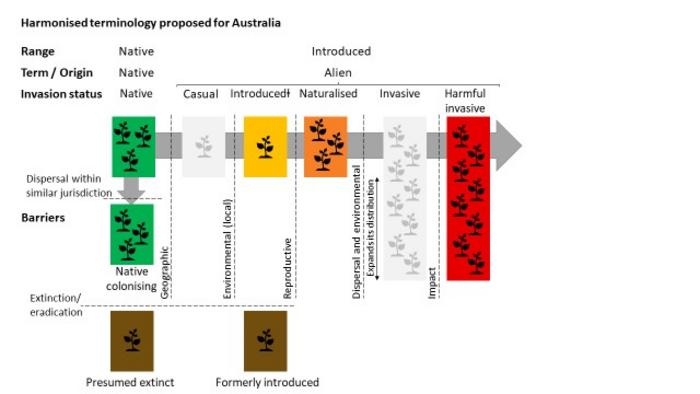In a leap towards managing the ecological challenge posed by alien plant species, a recent study outlines a methodology for integrating and harmonising data on plant invasions across Australia.

Credit: Designed by Dr Irene Martin-Fores
In a leap towards managing the ecological challenge posed by alien plant species, a recent study outlines a methodology for integrating and harmonising data on plant invasions across Australia.
Dr Irene Martín-Forés, from the Terrestrial Ecosystem Research Network and The University of Adelaide, Australia, and collaborators delved into the heart of the linguistic challenge of harmonising different frameworks on the invasion ecology language.
Published in NeoBiota, the researchers created a standardised and unified database at the Australian national level, known as the Alien Flora of Australia, which will help monitoring and early-warning of alien flora, prevent species introduction, streamline decision-making, and bolster biosecurity efforts.
They focused on Australia, a federally managed country, where they identified mismatches in definitions and records of invasion status for vascular plant taxa across different jurisdictions and proposed prioritisation procedures to tackle those mismatches and to integrate information from ten data sources into a harmonised workflow at the national scale.
“The importance of harmonising terminology on biological invasions cannot be overstated. It is not merely an academic pursuit but a practical necessity, essential for realising meaningful advancements in invasion ecology,” says Dr Irene Martín-Forés.
The authors recognise that the words used to describe alien species profoundly influence how humans perceive, study, and manage biological invasions. In federally managed countries, the problem is worse, as fragmented terminologies across different jurisdictions create confusion and inconsistencies in species classification and invasion statuses, therefore hindering effective communication among researchers, policymakers, and stakeholders.
The benefits of harmonising terminology on invasion ecology and combining contrasting data sources into a unified dataset at the Australian national scale extend far beyond semantic clarity. It enhances the accuracy of available datasets, and subsequently the reliability of scientific research focused on plant invasion. It also streamlines communication across jurisdictional borders and disciplines and empowers evidence-based decision-making in biosecurity management.
The workflow developed and its associated R script can be easily adapted to be used in any federally managed country, saving future efforts into trying to deal with inconsistencies in species’ invasion statuses.
Original source:
Martín-Forés I, Guerin GR, Lewis D, Gallagher RV, Vilà M, Catford JA, Pauchard A, Sparrow B (2024) Towards integrating and harmonising information on plant invasions across Australia. NeoBiota 92: 61-83. https://doi.org/10.3897/neobiota.92.113013
Journal
NeoBiota
DOI
10.3897/neobiota.92.113013
Article Title
Towards integrating and harmonising information on plant invasions across Australia
Article Publication Date
19-Mar-2024




